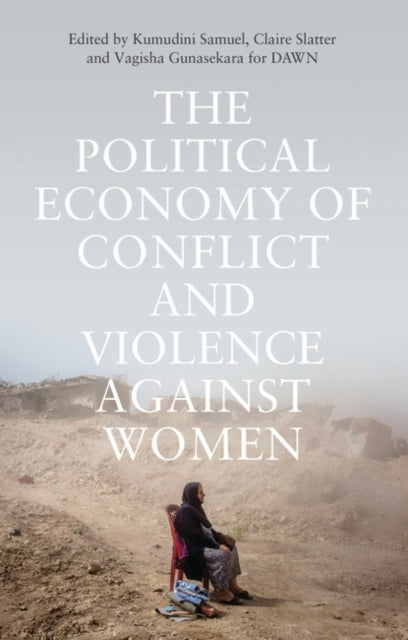Shulph Ink
Political Economy of Conflict and Violence against Women: Cases from the South
Political Economy of Conflict and Violence against Women: Cases from the South
YOU SAVE £2.58
- Condition: Brand new
- UK Delivery times: Usually arrives within 2 - 3 working days
- UK Shipping: Fee starts at £2.39. Subject to product weight & dimension
Bulk ordering. Want 15 or more copies? Get a personalised quote and bigger discounts. Learn more about bulk orders.
Couldn't load pickup availability
- More about Political Economy of Conflict and Violence against Women: Cases from the South
The Political Economy of Conflict and Violence against Women explores how political, economic, social, and ideological processes intersect to shape conflict-related gender-based violence against women. It argues that sexual orders and regimes are linked to spaces of production, which are sustained and reproduced during and after war through violence. It also develops a radical critique of liberal peace building and peace-making that does not challenge patriarchy or modes of production and accumulation.
\n Format: Paperback / softback
\n Length: 272 pages
\n Publication date: 15 August 2019
\n Publisher: Bloomsbury Publishing PLC
\n
The Political Economy of Conflict and Violence against Women delves into the intricate interplay of political, economic, social, and ideological factors that shape gender-based violence in conflict contexts. By employing a feminist lens, this collection explores the connections between sexual orders, power dynamics, and the production of spaces. It argues that these spaces are deeply entrenched in overlapping patriarchies, which are perpetuated and reinforced during and after wars through both physical and structural violence. Through an analysis of legal regimes and social structures, this book presents militarization as a political economic dynamic, offering a critical perspective on liberal peacebuilding and peacemaking approaches that fail to address patriarchy, modes of production, and accumulation.
The book highlights the importance of recognizing the political economy of conflict and violence against women as a holistic and intersectional phenomenon. It emphasizes the need to address the root causes of these issues, including systemic inequalities, power imbalances, and patriarchal norms. By doing so, it aims to contribute to the development of more effective and sustainable strategies for promoting peace, security, and gender equality.
One of the key insights of the book is that militarization is not merely a military or security issue but is also deeply intertwined with economic and social processes. The book argues that militarization is driven by the pursuit of economic interests, such as resource extraction, infrastructure development, and military contracting, which often exacerbate conflict and violence. Moreover, militarization can also contribute to the marginalization and oppression of women and other marginalized groups, as they are often excluded from decision-making processes and bear the brunt of the consequences of conflict.
To address these challenges, the book proposes a radical critique of liberal peacebuilding and peacemaking approaches. It advocates for a more intersectional and gender-responsive approach that recognizes the diverse experiences and needs of women and other marginalized groups. This approach involves challenging patriarchy, promoting social justice, and addressing the root causes of conflict, such as economic inequality and political marginalization.
The book also highlights the importance of engaging with local communities and grassroots organizations in the process of peacebuilding and peacemaking. It argues that these groups are often best positioned to identify the specific needs and challenges of their communities and to develop sustainable solutions to conflict. By working in partnership with these groups, policymakers and peacebuilders can ensure that their efforts are more effective and sustainable and that they are grounded in the realities of the communities they serve.
In conclusion, The Political Economy of Conflict and Violence against Women offers a comprehensive and insightful analysis of the complex relationship between conflict, violence, and gender. By employing a feminist lens and advocating for a more intersectional and gender-responsive approach, the book contributes to the development of more effective and sustainable strategies for promoting peace, security, and gender equality.
\n Weight: 296g\n
Dimension: 216 x 135 x 20 (mm)\n
ISBN-13: 9781786996107\n \n
This item can be found in:
UK and International shipping information
UK and International shipping information
UK Delivery and returns information:
- Delivery within 2 - 3 days when ordering in the UK.
- Shipping fee for UK customers from £2.39. Fully tracked shipping service available.
- Returns policy: Return within 30 days of receipt for full refund.
International deliveries:
Shulph Ink now ships to Australia, Belgium, Canada, France, Germany, Ireland, Italy, India, Luxembourg Saudi Arabia, Singapore, Spain, Netherlands, New Zealand, United Arab Emirates, United States of America.
- Delivery times: within 5 - 10 days for international orders.
- Shipping fee: charges vary for overseas orders. Only tracked services are available for most international orders. Some countries have untracked shipping options.
- Customs charges: If ordering to addresses outside the United Kingdom, you may or may not incur additional customs and duties fees during local delivery.


